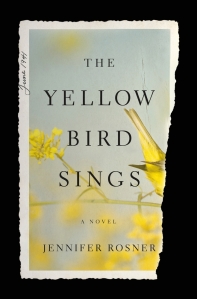The Yellow Bird Sings by Jennifer Rosner

The Yellow Bird Sings
by Jennifer Rosner
Flat iron Books
March 3, 2020
Historical fiction
Publisher's Summary
Poland, 1941. When the soldiers come to round up the Jewish men for labor duty, only half of them return. Róża knows that she must take her daughter Shira—already full of joy and music—away. The two find shelter in the hayloft of a farmer’s barn, where Shira struggles to stay still and quiet. Notes and melodies pulse inside the young girl, and it’s hard for her to resist the temptation to tap them out with her fingers and her feet. To pass the time, Róża tells Shira a story. There is a little girl who, with the help of her yellow bird, tends an enchanted garden…
With this game of make-believe, Róża soothes Shira and shields her from the horrors around them. But then the day comes when their haven is no longer safe and Róża must face an impossible choice: whether to keep Shira by her side or give her the chance to survive apart.
Inspired by the true stories of children hidden during World War II, THE YELLOW BIRD SINGS is a novel about the unbreakable bond between a mother and a daughter, the power of storytelling, and the triumph of hope in even the darkest of times.
Wow! This is my favorite book of the year!
Ms. Rosner’s writing is beautifully lyrical and soul clutching. So many varying emotions. This book left me speechless at the end. It's still swirling inside of me.
My father was a violin child prodigy, his family — Jewish and German. The tone in the story of the longing and heartbreak between Roźå, and Shira; the terror of what they went through, and the joy of the music was like returning to stories my Oma would tell us kids of her childhood. Her brother though thought to have died at Auschwitz-Birkenau was liberated and never reconnected with his family.
This book resonated deeply with me not only because of these family experiences but also it was just so well written.
An example of the lyricalness of this book:
Along their journey here, on the far outskirts of villages, Róża could permit Shira’s humming and tapping. Her tunes—startlingly complex and layered, notes merging and colliding—reminded Róża of the symphonies her father had listened to as he worked. “What music is that?” Róża had asked Shira. “Hmm?”“What you’re humming—” “Oh. Just what I hear in my head.” How Róża wishes Shira could continue, recognizing her talent and knowing what solace it brings her—but not now. “It’s lovely, but you must keep it inside you.”
We should never, ever forget what happened to so many different people during WWII. This book, and books like it, should be a lesson to all of us to never let this happen again! Some survivor's lives were affected for the rest of their life. Some decided it's not worth living, and others did the best they could to take what happened and make the rest of their lives worth something more than the experiences that they went through just like Shira and Róża do by making the world better through their talents.
I can't say enough about this book, and yet, I am still affected so much by it that I feel as if I don't have the words to do this book justice. I suggest that you go out, buy this book at your local Independent bookstore, and experience this book the way I did -- through the silence, the stiffness, the fear, the beauty, the friendships, the bullying, the sadness, the joy of the music, and a little yellow bird that metaphorically will stir and sing inside your soul for the rest of your life.


Jennifer Rosner is the author of the memoir If A Tree Falls: A Family's Quest to Hear and Be Heard. Her children's book, The Mitten String, is a Sydney Taylor Book Award Notable. Jennifer's writing has appeared in the New York Times, The Massachusetts Review, The Forward, Good Housekeeping, and elsewhere. She lives in western Massachusetts with her family.
Comments
Post a Comment